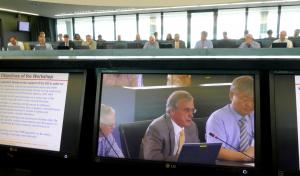The focus of the IBMC in 2017 has been to set up the ITER beryllium worker identification process and training program, to identify and produce the needed beryllium documentation and—with the support of the ITER Director-General—to organize a workshop on beryllium applications and health and safety.
The workshop, held on 28-30 June at ITER Headquarters, attracted 103 participants including nearly half from outside of the Organization, representing the Domestic Agencies, international organizations, beryllium suppliers and manufacturers, and users from China, Europe, Japan, Kazakhstan, Korea, Russia and the US.
The objective of the three-day session was to clearly identify the ITER Organization internationally as a major user of beryllium products and a major beryllium actor in the coming decades; to share the Organization's plan on dealing with beryllium issues and to receive feedback from international actors in the field; to learn from those who have experience in the areas of beryllium facility design, on-site operation, monitoring and training; and finally to demonstrate transparency on the ITER approach to beryllium safety.
In his presentation to the opening session, the ITER Director-General emphasized that protection of the stakeholders is an essential and top priority for the ITER Organization, before thanking the external participants for sharing their valuable experience and lessons learned in order to help the ITER Organization establish a robust and effective beryllium management worker protection program.
Information from the workshop will be particularly useful over the next year to help the IBMC improve the ITER beryllium training program and develop an ITER beryllium "code of practice."
* Due to the nuclear nature of the activities carried out by the ITER Organization, the Parties to the ITER Agreement stipulated that the ITER Organization shall observe applicable national laws and regulations of the Host State (France) in the fields of public and occupational health and safety, nuclear safety, radiation protection, licensing, nuclear substances, environmental protection and protection from acts of malevolence (Article 14).



